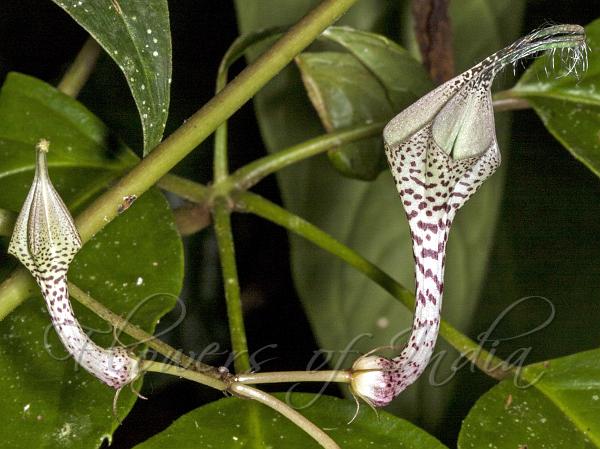|
| Shining Ceropegia |
|

|

| File size | 1107624 |
| Original date | 1/1/00 12:00 AM |
| Resolution | 2048 x 1536 |
| Flash | Flash fired |
| Focal length | 100.0mm |
| Exposure time | 1/160s |
| Aperture | 25.0 |
| Focus Distance | |
| Metering Mode | Multi-segment |
| Camera make | Canon |
| Camera model | Canon EOS 40D |
| Sensor type |
|
|
|
|
Photo: |
Botanical name: Ceropegia lucida Family: Apocynaceae (Oleander family)
Shining Ceropegia is a perennial, extensive twinning
herb, with stem sparsely hairy to hairless. It was presumed to be
extinct but has been rediscovered recently in Arunachal Pradesh in
2017, after a gap of 142 years. It is called shining because of the bright
green colored leaves. Leaves are simple, opposite-decussate,
exstipulate, stalked; leaf-stalk 0.8-1 cm long, slender, hairy. Leaf
blade is 7-9 cm long, elliptic-lanceshaped, oblong-lanceshaped, pointed
to tapering at tip, narrowed at base, slightly fleshy, dark green
above, pale below, hairless, ciliolate along margin. Flowers are borne
in leaf-axils, in 4-6-flowered umbellate cymes, flower-cluster-stalk
about 2 cm long, finely velvet-hairy, fleshy. Flowers are
yellowish-green with purple spots, stalked, stalk 1-1.8 cm long, round,
hairless. Calyx is 5-partite, sepals linear-subulate, hairless. Flowers
are 1.8-2.7 cm long; flower tube 1.2-2.5 cm long, cylindrical
throughout, hardly dilated at base, cylindrical, funnel-shaped at
throat, with ring of hairs at the throat of dilated part. Petals are
0.7-2.5 cm long, greenish-yellow blotched with purple, broadly or
elliptic-oblong, spoon-shaped, fused at the tip, transluscent hairy
along margins at upper half, hairs are considerably long. Corona
biseriate, outer corona with five shortly bifid-deltoid lobes, fringed
with hairs along margin; inner corona of 5 erectodivergent
linear-club-shaped, lobes. Shining Ceropegia is found in NE India and
parts of SE Asia. Flowering: September-November.
| Identification credit: Sushant More | Photographed in Namdhapha National Park, Arunachal Pradesh. |
• Is this flower misidentified? If yes,